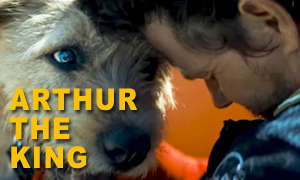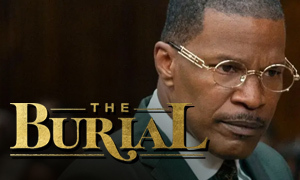The Tender Bar: History vs. Hollywood
Daniel Ranieri
Born: 2011
Birthplace:
Dyker Heights, Brooklyn, USA
Young J.R. Moehringer
Born: December 7, 1964
Birthplace: New York City, New York, USA
Tye Sheridan
Born: November 11, 1996
Birthplace:
Elkhart, Texas, USA
J.R. Moehringer
Born: December 7, 1964
Birthplace: New York City, New York, USA
Lily Rabe
Born: June 29, 1982
Birthplace:
New York, New York, USA
Dorothy Moehringer
Born: November 3, 1938
Death: August 26, 2019
Max Martini
Born: December 11, 1969
Birthplace:
Kingston, New York, USA
Johnny Michaels
Born: February 17, 1937
Birthplace: New York City, New York, USA
Death: February 8, 2002
Did the real J.R. Moehringer grow up without a father?
Yes, and The Tender Bar true story reveals that like in the movie, Moehringer's own father, a disc jockey named Johnny Michaels, had left when Moehringer was just seven months old. The boy would eventually find a group of substitute fathers at the bar where his Uncle Charlie worked, both via his uncle (his mother's brother) and some of the colorful regulars that included soldiers, actors, bookies, cops, poets, etc.
In his memoir, Moehringer writes that the bar was the only place where he felt safe. Despite their gambling and cursing, the men helped to guide Moehringer through the ups and downs of his youth. "I guess, in a way, having any role models is better than having no role models, with notable exceptions. But still, these guys were better than nobody." Moehringer grew up hearing his father on the radio, which he said created a kind of "haunting ache" since he could listen to him but not see him. In his memoir, he refers to his father simply as "The Voice." It was one of his father's radio nicknames and what his grandmother called him so she wouldn't have to say his name aloud.
What does the "J.R." in Moehringer's name stand for?
The initials J.R. stand for Junior. John Joseph "J.R." Moehringer, Jr. was named after his father, Johnny Michaels, a New York disc jockey who ended things with J.R.'s mother, Dorothy Moehringer, prior to J.R. ever getting to know him. J.R. Moehringer's father's real name is John Joseph Moehringer (Jonny Michaels was his radio persona). In comparing The Tender Bar vs. the book, we confirmed that J.R. opted to use the initials because he didn't want to be associated with his father.
Is Ben Affleck's character based on J.R. Moehringer's real-life uncle?
Yes. Ben Affleck's Uncle Charlie in the movie is based on Moehringer's real-life Uncle Charlie, a barkeep who had two nicknames, "Chas" and "Goose." Like in the film, our Tender Bar fact-check confirms that Charlie was a colorful character who had a penchant for gambling and alcohol. However, unlike Ben Affleck's version of Uncle Charlie in the movie, Moehringer described his real-life Uncle Charlie as being bald and without eyelashes or eyebrows. This was the result of alopecia, a disease of the immune system. It resulted in Charlie being self-conscious of his appearance. There are no pictures of Uncle Charlie in Moehringer's memoir, nor do any appear to exist online.
Some of the other regulars at the bar in the movie were also inspired by real-life individuals, including the other bartender, Joey D., portrayed by actor Matthew Delamater. Moehringer says that in his English classes, he was already writing about the interesting characters at the bar by the time he was 15, long before he featured them in his memoir. He would often scribble down the interesting things they said on cocktail napkins. He told NPR that "many nights somebody would shove a cocktail napkin at me and say, 'Write that down. That thing I just said? That's pretty funny. Write that down.' It was as if they wondered when someone was going to come along and start recording their wisdom and their witticisms."
While researching the J.R. Moehringer true story, we learned that Ben Affleck had a similar past as the author, who is the subject of the George Clooney-directed The Tender Bar. Ben Affleck's own father, Timothy Affleck, who was once an aspiring playwright, worked as a bartender in Massachusetts in the 1980s. Growing up, Ben and his brother Casey spent a lot of time hanging around the bar while their dad was working. -Vanity Fair
How old was J.R. Moehringer when he first walked into the bar where his uncle worked?
"I was 10, and I was sent down there by grownups to get some cigarettes from my Uncle Charlie," Moehringer told host James Michael Tyler in 2008 during an Expanded Books Tender Bar Interview.
Did J.R. Moehringer live with his grandfather?
Yes. In comparing The Tender Bar vs. the memoir, we found that in his book, Moehringer describes his impoverished extended family, specifically the time he and his mother spent living in the run-down home of his mother's parents, which included his grandpa, portrayed by Christopher Lloyd. Moehringer writes that his grandfather was "too cheap to be an alcoholic" and would continually call his wife "Stupid Woman" instead of using her name. J.R. Moehringer's grandparents' home was just 142 steps from the bar where his Uncle Charlie worked.
In high school, he went with his mother, Dorothy Moehringer, to live in Arizona. The movie entirely omits the years he spent in high school in Arizona, opting instead to fictionally depict him as living with his grandparents on Long Island until he leaves for college.
Did J.R.'s mother have a tumor on her thyroid?
Yes, and like in the movie, it was malignant. Dorothy underwent surgery in 1975 to have it removed and spent a week in the hospital. Unlike what's seen in the movie, J.R. and his mother had been living in a nearby apartment in Great Neck, Long Island at the time, not with his grandparents.
Is The Tender Bar based on author J.R. Moehringer's memoir?
Yes. As indicated above, The Tender Bar movie is based on American journalist J.R. Moehringer's memoir of the same name, which was published in 2005. It chronicles the experiences of his youth from age eight to his early twenties, including the time he spent at a local bar called Dickens, often to escape his turbulent family life. In order to condense the book into a movie, the film catches up with Moehringer in 1973 when he is 11 and skips over most of his teenage years. The second half focuses on him when he is a college-age young man (played by Tye Sheridan).
Moehringer says that it took him most of his life to write the novel, repeatedly trying and failing to successfully translate the guys at the bar to the page. He said that he would show up at the bar with chapters for the men to read, eager to get their feedback. "They were flattered that I was trying to write about them," he told NPR in 2005, "but we all recognized that I was not capturing them on the page. So it took a long time 'cause I didn't know how to capture [the bar]."
Did J.R. Moehringer hang out at the beach with some of the patrons from the bar?
Yes. The Tender Bar true story confirms that some of the establishment's regulars often spent their days at the beach. They started to invite J.R. when he was around 10-years-old. "That's where they spent their days," he told C-SPAN, "because of course they spent all night at the bar. And that was my indoctrination to the bar." He also went with them to the ball park and race track.
Did J.R. Moehringer's mother push him to become a writer?
Yes. J.R. describes his mother, Dorothy Moehringer, as being the real hero of his memoir. He says that she was the person who encouraged him to become a writer. Like in the movie, she was also the one who had become fixated on him going to Harvard or Yale, which had initially seemed like an impossible dream but did in fact come true when he attended Yale. -New York Times
Is J.R.'s girlfriend Sidney based on a real person?
Yes. J.R.'s relationship with Sidney (portrayed by Briana Middleton in the movie) is a significant part of the memoir. Like in the movie, she came from a wealthy family. Her parents owned a construction company and their home was located in southern Connecticut, directly across the sound from Manhasset, J.R.'s hometown. She hoped to become a filmmaker or an architect. The movie alters Sydney's appearance. In real life, she wasn't black. In his memoir, J.R. describes her as having blond hair ("thick yellow hair") and almond-shaped brown eyes. He said that she had a fit body like ice skater Dorothy Hamill and had a version of Hamill's haircut. It's true that Sidney toyed with J.R.'s emotions by seeing other guys and breaking up with him multiple times.
Did the people at the bar teach J.R. Moehringer about manhood?
Yes. "The good and the bad," said Moehringer. "I learned what not to do as much as I learned what to do. But they taught me how to love. How to tell stories. And they were always a group of men that I could go to and have them congratulate me and be proud of me, and I think every young boy needs that." -C-SPAN
Did J.R. Moehringer initially work for The New York Times as a copyboy?
Yes. As we conducted The Tender Bar fact-check, we learned that J.R.'s demoralizing and lengthy stint as a copyboy at The New York Times comes straight from Moehringer's memoir. It's true that higher-ups at the paper voted not to promote him to reporter. Eventually, he landed a job at the Rocky Mountain News in Colorado and moved to Breckenridge in 1990. In 1994, he was hired by the Los Angeles Times and worked as a reporter for the Orange County bureau, a beat that he did not enjoy. He was a finalist for the Pulitzer Prize in Feature Writing in 1998, and he was awarded the Pulitzer for Feature Writing in 2000 for his on-location work for the Los Angeles Times in the South, specifically his portrait of Gee's Bend, which showcased the "isolated river community in Alabama where many descendants of slaves live, and how a proposed ferry to the mainland might change it." -Pulitzer.org
The movie ends before Moehringer's years working as a journalist in Colorado and then for the Los Angeles Times, opting instead to force his somewhat untidy life into a neat plot, which true story movies often do. It is implied he finished his memoir shortly after leaving The New York Times, but in reality, it would take approximately another 15 years for him to complete it and get it published.
What is the real Tender Bar location?
The bar, which is located in Manhasset, New York (a hamlet on the North Shore of Long Island), still exists but under different ownership. It was called Dickens back when J.R. Moehringer used to hang out there as a boy in the 1970s. The owner, Steve, then renamed it Publicans (a publican is another word for bartender). After it was sold in the 1990s, it was renamed Edison's Ale House. Edison's closed in 2016 and the bar has since reopened as Publicans again. The exact Tender Bar location on Long Island is 550 Plandome Rd., Manhasset, NY 11030.
Did J.R. meeting Sidney's parents happen like it does in the movie?
Not exactly. While the bedroom scene at Sidney's house the night before happened as it does in the movie, the scene at the breakfast table with Sidney's parents is heavily fictionalized. In real life, J.R. did feel like Sidney's parents' questions were a test, but he didn't become condescending and offend them like he does in the movie, nor did they belittle him. The conversation didn't end with J.R. making a crude comment about Sidney's parents in the backseat of a Volvo. In reality, J.R. said that Sidney's parents looked relieved when he told them he was thinking about law school. They were polite to each other and the conversation ended with J.R. parting so Sidney could drive him to the airport. It was on the drive that she revealed she was seeing other people.
What happened to the real Uncle Charlie from The Tender Bar true story?
After the owner of the bar died, his widow, Georgette, fired Uncle Charlie for his "flamboyant rudeness," which instead of being funny had become disagreeable. Charlie had become the caretaker of his parents' (J.R.'s grandparents') house and lived there alone for a time until the house was damaged in a fire. It was then that the house was sold and Charlie left New York, eventually disappearing altogether, something that J.R. says he feared would happen. -The Tender Bar Memoir
Does J.R. Moehringer still hang out in bars?
"No, I don't," he said. "There was something different about this bar. So, even when I was hanging out there, I didn't think of it as hanging out in bars. I always felt that this bar was better than other bars, and looking back, I feel even more certain of that. It was different, and it was not just a bar. It was a meeting place of my hometown. It was the beating heart of the community where I grew up. It was a way I learned how to become a man, and it was also where I learned to love storytelling and storytellers. To me, it was always something other than a bar, and when the bar closed, I had no reason anymore to hang out in bars." -Expanded Books Interview
Is it true that J.R. Moehringer is going to co-write Prince Harry's autobiography?
Yes. Following the success of his memoir The Tender Bar, several celebrities have approached Moehringer and asked him to collaborate on their own autobiographies. One of the first was retired tennis star Andre Agassi, who had read Moehringer's memoir and became a fan of his work. Agassi and Moehringer collaborated on Agassi's 2009 memoir Open: An Autobiography. Moehringer also ghostwrote Shoe Dog, the memoir of Phil Knight, co-founder of Nike.
In June 2021, it became public that Prince Harry, Duke of Sussex had chosen J.R. Moehringer to co-write his autobiography, which is supposed to be released in late 2022.
How do the men from the bar feel about J.R. Moehringer's book that depicts them?
"They’re proud of this book," Moehringer told C-SPAN of the men. "And that's a great relief for me, because they feel as if their stories have been presented truthfully and so it sort of validates their lives in a way."







